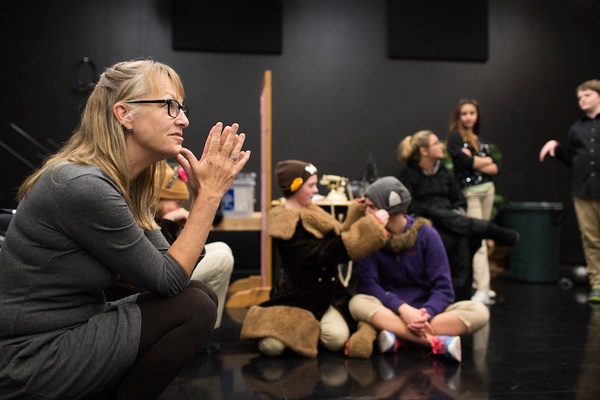
I’m a comedian who moved to Chicago to study and practice the artform, so I’ve taken my fair share of comedy classes. My first was a summer intensive at The Second City, in which I opted for crash courses in both improv and writing. I was instantly hooked. After years of writing and performing sketch comedy, I took a stand-up comedy class in which I learned how to structure jokes, create a set list, and find my own voice.
This last skill is key, and it shows just how much comedy classes have to offer people who don’t aspire to tell jokes on stage. In fact, plenty of comedy teachers and past students will attest that non-comedians have as much to learn from classes in improv, sketch, and stand-up as anyone else. The skills it takes to make people laugh, it turns out, have more real-life uses than you might imagine.
Comedy for the Workplace
Pete Aiello is the creator of Team Pete, a one-man educational tour-de-force geared toward non-performers. He helms a Workplace Improv program that taps into improv’s basic tenets—listening, collaborating, and having fun—and translates them to the workplace. “When people get comfortable and allow themselves to be vulnerable,” Aiello states on his website, “they open up to new ways of thinking, become better listeners, and work together with others more effectively.”
Comedy for Self-Confidence
Aiello also co-leads Fear Experiment, a program invented by his wife, Saya Hillman, the creator of Mac & Cheese Productions. The idea behind Fear Experiment is simple: participants sign up to do something that scares them, such as improv or storytelling. Then, they train in that artform for three months before performing in front of 700 people at Park West, a popular Chicago venue.
Why subject yourself to such a terrifying experience? Because challenging yourself to do something scary can be a great way to boost your self-confidence and self-esteem. It can also unlock the door to a new form of self-expression, which might manifest itself in a work promotion or a tendency to give impassioned speeches on the train.
Comedy for the Classroom
The Second City is known for the string of stars it has produced over the years, but the comedy stalwart has also trained laypeople with no professional interest in comedy. Its Workshops for Educators, for example, teach ways to use improv’s core tenets inside the classroom. During the Improvisation for Educators class, instructors coach participants on how to instill improv games and principles into their curriculum. This may involve helping students collaborate on a team project or find different angles to solve a math problem.
Comedy for Women of All Kinds
As a student of Feminine Comique, a women’s stand-up class started by Cameron Esposito to address the dearth of women in the stand-up world, I met fellow performers with dreams of large stages and even larger audiences. But I also met women in completely unrelated professions looking for a new outlet, a fun challenge, or a way to prove to themselves that they could tackle a daunting artform. Thanks to the class and post-class show, they were able to strengthen their writing, improve their memorization skills, and trust their instincts. All of the above, of course, are worthy reasons to take a comedy class.